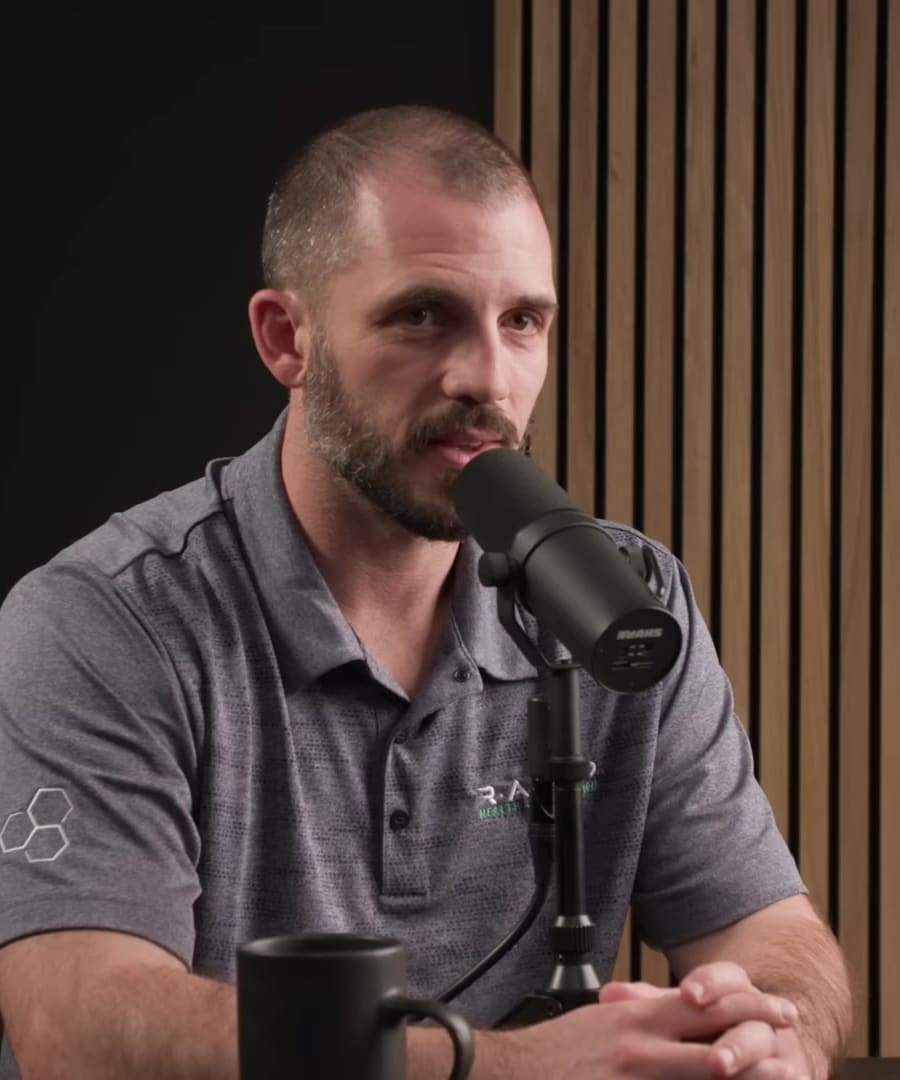What protocols are recommended for improving sleep?
Sources:
Here are several protocols recommended on the for improving sleep, featuring insights from both and sleep expert :
Basics of Good Sleep Hygiene
- Regularity: Go to bed and wake up at the same time every day. Consistency helps anchor your sleep and improves both its quantity and quality 1.
- Darkness: Dim lights at least an hour before bed to stimulate melatonin production, enhancing sleep onset 1.
Advanced Strategies
- Behavioral Adjustments After a Bad Night: If you've had a poor night of sleep, resist compensating by sleeping in, napping, or over-consuming caffeine. Stick to your regular sleep schedule to reset your sleep-wake cycle effectively 2.
- Limit Time in Bed: For those struggling with insomnia, limiting time in bed can make sleep more efficient. This approach is part of Cognitive Behavioral Therapy for Insomnia (CBTI), which involves a tailored protocol to improve sleep 3.
Enhancing Deep Sleep
- Exercise: Regular physical activity can significantly improve the electrical quality of deep sleep. However, avoid overly exhaustive guidelines and aim for consistency 4.
- Cool Environment: Keeping your bedroom cool promotes deep sleep. Adjusting the temperature can help maintain stable and high-quality deep sleep 4.
Additional Tips
- Use Specific Apps and Tools: Apps like Timeshifter can help manage jet lag by calculating optimal light exposure, stimulants, and food intake based on your travel schedule 5. The Reverie app, which offers sleep hypnosis, can enhance sleep efficiency and address insomnia 5 6.
- Only Sleep and Sex in Bed: Ensure that your bed is reserved for sleep and sex only. This helps condition your brain to associate your bed with sleep, reducing insomnia and improving sleep quality 5.
Employing these strategies can help to develop a consistent, high-quality sleep routine. For further details, exploring episodes from the is beneficial.
RELATED QUESTIONS4 part series on sleep
The has a special 4-part series dedicated specifically to sleep. Here are the episodes in this series:
-
Episode 31: Master Your Sleep & Be More Alert When Awake
- This episode covers the fundamental processes that control when you get sleepy and when you wake up, and includes actionable tools to enhance sleep quality.
-
Episode 32: Enhance Sleep Quality 10X with These Tools
- Delve deeper into optimizing sleep through a variety of tools and tactics, focusing on light exposure, exercise, temperature, and nutrition.
-
Episode 33: Perfect Your Sleep with Science
- Explores scientific techniques and practices to perfect sleep quality, addressing common issues such as insomnia and fragmented sleep.
-
Episode 34: Sleep, Learning and Memory Enhancement
- Examines the crucial role of sleep in learning and memory, offering strategies to ensure sleep supports cognitive performance.
These episodes are part of a comprehensive guide to understanding and improving sleep from various perspectives. You can explore these episodes on the for more detailed information and actionable tips.
RELATED QUESTIONS-
matthew walker
Sources:
Matthew Walker is a renowned British neuroscientist, author, and professor of neuroscience and psychology at the University of California, Berkeley. He specializes in sleep research and its impact on physical and mental health. Walker is noted for his significant contributions to clinical assessments and treatments for sleep disorders. Apart from his academic work, he also explores sleep science through his own podcast, aptly named "The Matt Walker Podcast" 1.
On the , Matthew Walker engaged in enlightening discussions on sleep. His expertise has been instrumental in broadening the understanding of sleep's crucial role in overall health. Notably, often references Walker's research in multiple episodes, highlighting the importance of quality sleep for cognitive and physical well-being.
For in-depth exploration, you can listen to his episodes on "The Matt Walker Podcast" and various appearances on Huberman Lab and other podcasts.
RELATED QUESTIONSWhat is Matthew Walker's latest research?
Sources:
Matthew Walker's latest research explores several impactful areas of sleep science. Here are a few key highlights:
-
Genetic Impact of Sleep: Recent studies have revealed that limiting sleep to six hours per night for a week can cause significant changes in gene activity. This disruption affects genes linked to immune function, tumor promotion, chronic inflammation, and cardiovascular health. It underscores the extensive physiological impact of sleep deprivation 1.
-
Closed-Loop Stimulation: Walker is also working on enhancing deep sleep using closed-loop brain stimulation. This method involves precisely timed electrical brainwave stimulation tailored to an individual's unique brainwave patterns. Early results suggest it can boost memory and other benefits by enhancing deep sleep brainwaves and sleep spindles 2.
-
Sleep and Food Choices: Another interesting finding is how sleep affects food preferences and choices. Sleep deprivation leads to a preference for unhealthier foods and impairs the brain's ability to regulate healthy food choices. This occurs due to changes in brain regions responsible for emotional regulation and reward, such as the frontal lobes 3.
-
Image Rehearsal Therapy (IRT): For individuals suffering from nightmares, Walker has discussed the effectiveness of IRT, which involves modifying the endings of recurring nightmares to be less distressing. This therapy utilizes the concept of memory reconsolidation to help reshape traumatic memories, providing hope for those with nightmare disorders 4.
These insights and ongoing research contribute to a deeper understanding of the critical role of sleep in health and well-being.
RELATED QUESTIONS-
Summarize Dr. Matthew Walker: The Biology of Sleep & Your Unique Sleep Needs | Huberman Lab Guest Series
The features a detailed discussion between and about the science of sleep and how it affects various aspects of human health. Here are the key points covered in the episode:
-
Importance of Sleep:
- Sleep is crucial for overall health, impacting everything from immune function to brain performance.
-
Sleep Structure and Variability:
- The episode explores different sleep stages (1, 2, and 3) and REM sleep, highlighting their individual roles and benefits. Sleep cycles vary greatly among individuals.
-
Deep Sleep:
- Deep sleep, particularly slow-wave sleep, is essential for physical and mental restoration. It's linked to memory consolidation, growth hormone release, and cognitive function.
-
REM Sleep:
- REM sleep is critical for emotional processing, creativity, and brain maintenance. Dreaming during REM aids in psychological well-being.
-
Sleep Positions and Disorders:
- Sleep position can impact sleep quality, and disorders like sleep apnea are discussed, along with their effects on sleep quality.
-
Yawning and Sleepiness:
- The phenomenon of yawning and its possible links to brain cooling and alertness is examined.
-
Genetic and Chronotype Factors:
- Sleep needs and patterns can be influenced by genetics, including chronotypes (morning lark vs. night owl). Understanding your chronotype can help optimize sleep and performance.
-
Impact of Sleep on Health:
- Sleep deprivation affects the immune system, weight control, and cognitive function. Adequate sleep is linked to better metabolic health, immune response, and reduced stress levels.
-
Sleep Hygiene and Optimization:
- Practical tips for improving sleep include maintaining regular sleep schedules, creating a sleep-conducive environment, and managing light exposure.
This episode provides a comprehensive overview of the biological underpinnings of sleep and practical advice for optimizing sleep based on individual needs.
RELATED QUESTIONS-
What is Matthew Walker's latest research?
Sources:
and his research team focus on how sleep impacts various aspects of health and well-being. Recent findings and ongoing experiments include:
-
Sleep Deprivation and Gene Activity:
- A study from the University of Surrey highlighted that just one week of limited sleep (6 hours per night) alters the activity of 711 genes. These changes impact immune function, inflammation, and tumor promotion, underscoring the systemic importance of sleep 1.
-
Food Preferences and Brain Activity:
- Research showed that lack of sleep increases the desirability of unhealthy foods. The study used brain scans to reveal that the frontal lobe, which regulates decision-making, goes offline, while hedonic regions become more active, leading to poorer food choices 1.
-
Memory and Scent:
- Walker's team used rose scents to enhance memory retention. Participants exposed to the rose scent both during learning and sleep showed improved memory recall, suggesting that targeted memory reactivation using scents could be beneficial 2.
-
Emotional Regulation:
- Ongoing research shows a strong link between sleep and emotional health. Walker emphasizes that sleep deprivation affects emotional regulation and can lead to heightened emotional responses. Quality sleep, conversely, acts as an emotional balm, helping to stabilize moods and improve overall mental well-being 3.
-
Creative Problem-Solving:
- Sleep not only consolidates memories but also cross-links and integrates them, leading to enhanced problem-solving abilities and creativity. This process updates associative networks in the brain, fostering innovative thinking and insights 4.
Overall, continues to explore how sleep influences various cognitive and physiological processes, highlighting strategies to improve sleep quality and its profound impact on health.
RELATED QUESTIONS-
What protocols are recommended for improving sleep?
- RELATED QUESTIONS
4 part series on sleep
- RELATED QUESTIONS
matthew walker
- RELATED QUESTIONS
What is Matthew Walker's latest research?
- RELATED QUESTIONS
Summarize Dr. Matthew Walker: The Biology of Sleep & Your Unique Sleep Needs | Huberman Lab Guest Series
- RELATED QUESTIONS
What is Matthew Walker's latest research?
- RELATED QUESTIONS












